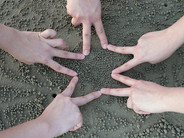You are not alone. As highlighted by this WSJ article, some adults exhibit the classic symptoms of childhood attachment disorder throughout their adult lives.
http://online.wsj.com/article/SB10000872396390443995604578002352537833908.html?mod=e2tw
Attachment theory posits that the nature of the relationships that human beings have with their primary caregivers in childhood sets the tone for subsequent relationships in adulthood. According to this theory, for example, a child may be anxious about the availability and amount of nurturance and care from their parent, perhaps due to the parent's constant unavailability for whatever reason. This child may then consciously or unconsciously continue to suspect this same inconsistency from any current primary relationship even in their adulthood and hence constantly scan the environment to ensure that all is well and the loved one is always available.
No matter what the reason is for the development of separation anxiety, whether this anxiety is genetic, modeled by others, or conditioned by the individual's circumstances, or even a combination of all the above reasons, this is a very real problem faced by many adults. While everyone battles the uncertainty and finality of life at one point or another, not everyone lives their lives in constant fear of losing their loves ones.The good news is that for those that do, there are a number of things that they can do to help battle this problem including talk therapy, mindfulness training/meditation, medications and/or any form of self-exploration.



 RSS Feed
RSS Feed